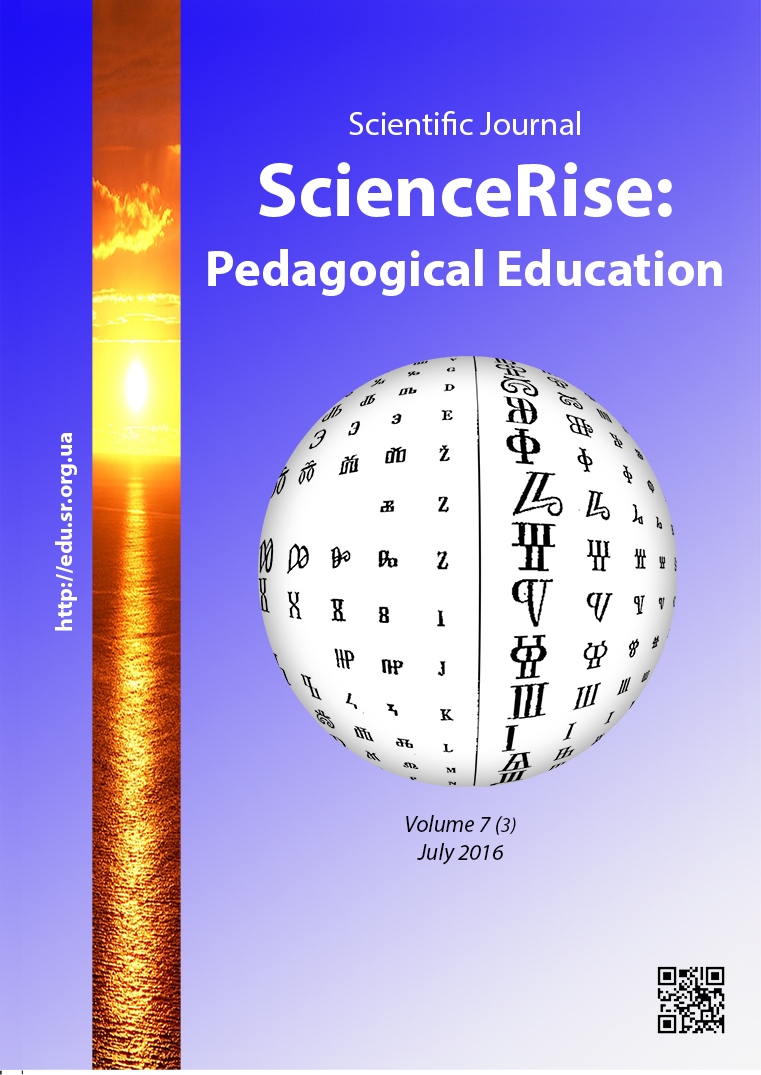The development of professional culture of future doctors: communicative aspect
DOI:
https://doi.org/10.15587/2519-4984.2016.73920Keywords:
future doctor, communicativeness, professional culture, medical education, pedagogical conditions, developmentAbstract
Article is devoted to the formation of communicative competence as a component of professional culture of the future doctors. There were concretized theoretical notions about the role of communicativeness of the future doctors. There were determined pedagogical conditions of formation of communicative competence of the future doctors in the process of learning in the higher medical educational institutions, presented the features of preparation of students for realization of communicative function as an important component of medical profession.
Communicative competence is understood as a totality of experience, communicative knowledge, abilities, skills, competences that allow creatively present the doctor’s personality in the sphere of professional competence for solving many problems. Communicativeness is a part of contact of the doctor. Communication favors the building of constructive dialogue between the doctor and patient, help to find individual approach to the patient. Communicative readiness of the future doctor for professional activity is determined by skills and abilities to the practical language interaction with peopleReferences
- Kudryavaya, N. V. (2001). Vrach-pedaghogh v yzmenyayushhemsya myre: tradycyy y novacyy. Moscow, 304.
- Averyn, V. A. (1997). Psykhologhyya v strukture vysshego medycynskogo obrazovanyya. Sankt-Peterburg, 39.
- Aharkova, A. O. (2011). Formuvannia profesiino-etychnoi kultury maibutnikh likariv u vyshchykh navchalnykh zakladakh. Kyiv, 22.
- Belyaeva, Ye. S. (2006). Tvorchesko-pedagogicheskiy aspekt v professionalnoy podgotovke studentov-medikov. Moscow, 204.
- Dudikova, L. V. (2011). Formuvannia hotovnosti do profesiinoho samovdoskonalennia u maibutnikh likariv. Vinnytsia, 22.
- Grando, A. A. (1990). Vrachebnaya etika i meditsinskaya deontologiya. Tallin, 350.
- Kolisnyk-Humeniuk, Yu. I. (2013). Formuvannia profesiino-etychnoi kultury maibutnikh fakhivtsiv u protsesi humanitarnoi pidhotovky v medychnykh koledzhakh. Lviv, 296.
- Krylova, N. B. (1990). Formirovanie kultury budushchego spetsialista. Moscow, 142.
- Lisovyi, M. I. (2006). Formuvannia profesiinoho movlennia maibutnikh medychnykh pratsivnykiv u vyshchykh medychnykh navchalnykh zakladakh. Vinnytsia, 20.
- Uvarkina, O. V. (2003). Formuvannia komunikatyvnoi kultury studentiv vyshchykh medychnykh zakladiv osvity v protsesi vyvchennia psykholoho-pedahohichnykh dystsyplin. Kyiv, 160.
- Chmut, T. K., Chajka, G. L. (2007). Etyka dilovoho spilkuvannia. Kyiv, 230.
- Loshakova, T. F. (2001). Pedagogicheskoe upravlenie protsessom sozdaniya komfortnoy sredy v obrazovatelnom uchrezhdenii. Yekaterinburg, 416.
- Slobodchikov, V. I. (1997). Educational environment: realization of educational goals in the space of culture. New values of education: cultural model schools, 7, 177–185.
- Derner, K. (2006). Khoroshiy vrach. Uchebnik osnovnoy pozitsii vracha. Moscow, 544.
- Baranovska, L. (2000). The didactic aspect of professional verbal communication. Pedagogy and psychology of professional education, 1, 140–145.
- Vygotsky, L. S. (2003). History of development of higher mental functions. Vol. 3. Moscow: Pedagogy, 316.
Downloads
Published
How to Cite
Issue
Section
License
Copyright (c) 2016 Мария Дмитриевна Дяченко

This work is licensed under a Creative Commons Attribution 4.0 International License.
Our journal abides by the Creative Commons CC BY copyright rights and permissions for open access journals.
Authors, who are published in this journal, agree to the following conditions:
1. The authors reserve the right to authorship of the work and pass the first publication right of this work to the journal under the terms of a Creative Commons CC BY, which allows others to freely distribute the published research with the obligatory reference to the authors of the original work and the first publication of the work in this journal.
2. The authors have the right to conclude separate supplement agreements that relate to non-exclusive work distribution in the form in which it has been published by the journal (for example, to upload the work to the online storage of the journal or publish it as part of a monograph), provided that the reference to the first publication of the work in this journal is included.







